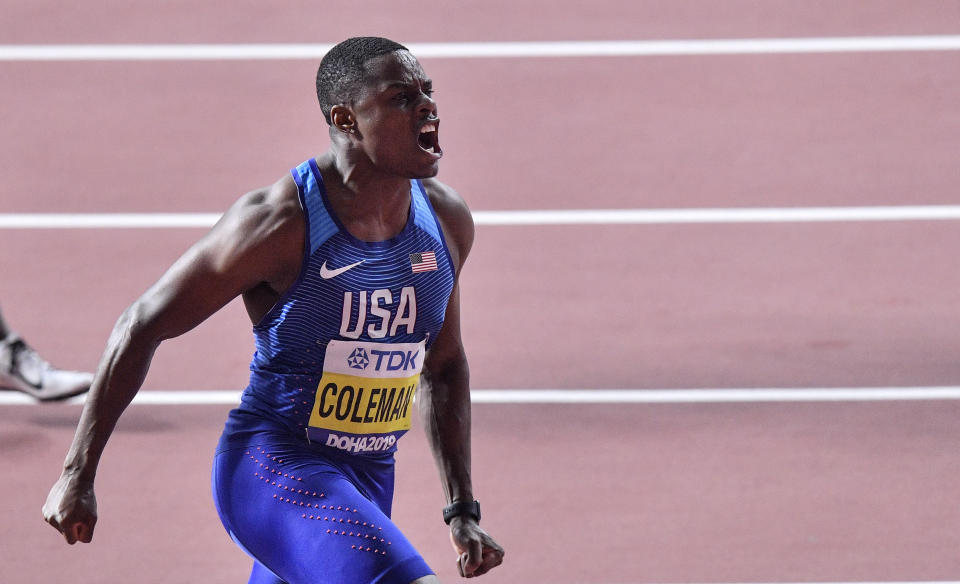Olympic 100m favorite Christian Coleman suspended after allegedly missing another drug test
For a second straight year, top American sprinter Christian Coleman is facing a ban that would cost him a spot at the Tokyo Olympics, where he is among the favorites in the 100-meter dash.
The 2019 100m world champion tweeted a lengthy statement Tuesday that revealed he is facing another ban for allegedly missing a drug test with the International Association of Athletics Federations’ Athletics Integrity Unit.
Hours later, the AIU announced that Coleman was under provisional suspension until reaching a final decision at a hearing, per ESPN.
Coleman’s allegedly missed test would be his third in the span of a year, which could trigger a two-year ban and keep him out of the 2020 Summer Olympics, which were rescheduled to 2021 due to the coronavirus pandemic. Coleman faced almost the exact same situation last summer after a missed test.
In his statement, Coleman questioned the specifics of his allegedly missed drug test and lambasted the system in place where athletes need to log their whereabouts with the authorities at all times.
Y’all know this is wrong @aiu_athletics something needs to change. “Integrity unity” smh pic.twitter.com/Z2TQvNt8hQ
— Christian Coleman (@__coleman) June 16, 2020
The missed test reportedly occurred on Dec. 9, 2019. The two other violations were a missed test on Jan. 16, 2019, which he did not dispute, and a filing failure on April 26, 2019. Coleman noted that at no point has he actually tested positive for a banned substance.
Under U.S. Anti-Doping Agency rules, athletes are required to notify the authorities of their whereabouts at all times, including their daily regular schedule and any changes or travel plans, and submit a specific 60-minute window every day when they must be available for testing any day of the year.
It is in that window where Coleman’s troubles occurred.
Coleman: Testers did not call, might have had wrong address
As Coleman recalls, AIU testers arrived at his apartment on Dec. 9 when he was Christmas shopping five minutes away and made no attempt to contact him when they arrived beyond ringing a doorbell. Coleman contends that he received a phone call every other time he has been tested, and would have met with the testers had he been called.
Coleman received a notice of his missed test the next day. Two days later, Coleman was tested with no issue in his results, and has been tested multiple times since despite the coronavirus pandemic.
On the missed test notice, of which Coleman posted a screencap, the testers specifically reported they did not call per AIU instructions. Coleman said he had actually returned to his apartment in time for his 7:15-8:15 p.m. window, but did not run into the testers on the way in despite their claim on the notice that they stayed for the full hour.
Coleman noted that the testers wrote down the wrong address and wondered if they were even at the right apartment. His parents have since bought him a Ring doorbell.
That is true. They can come at any time but we have to be available for at least 1 hr per day. I was back in time for my window so I should’ve ran into the tester if he was there. He put down the wrong address..so idk and I didn’t get a call like every other time so I had no idea
— Christian Coleman (@__coleman) June 17, 2020
With testers making the unusual decision not to call him, allegedly leaving before his hour was up and possibly appearing at the wrong address, Coleman said he believed the events of Dec. 9 were a “purposeful attempt to get me to miss a test.”
In announcing his provisional suspension, the AIU hit back by saying it usually asks employees not to call because it could supposedly undermine the testing program.
From ESPN:
"Any advanced notice of testing, in the form of a phone call or otherwise, provides an opportunity for athletes to engage in tampering or evasion or other improper conduct which can limit the efficacy of testing,'' the AIU said in an emailed statement.
Coleman added that the system of constantly having to tell the organization his whereabouts has triggered several panic attacks and claimed that some people who actually failed drug tests have faced less severe consequences than him.
Per ESPN, the AIU has filed a similar charge this month against women's 2019 400-meter world champion Salwa Eid Naser of Bahrain. She was already under investigation when she won gold in Doha last year in the fastest time since 1985. Former U.S. national 200-meter champion Deajah Stevens was also provisionally suspended in May.

USADA clerical error caused Coleman’s previous issue
Coleman already didn’t think very highly of drug testing authorities due to his treatment the last time he was facing this kind of ban.
After confirming he was facing a ban, the USADA dropped its case against Coleman last September due to a clerical technicality. At that time, it was a filing failure alleged to have occurred on June 6, 2018 that was the first of three violations. However, World-Anti-Doping Agency rules dictate that the date of a filing failure is set as the first day of the quarter in which the failure occurred, backdating it to April 1, 2018 and putting his three violations more than a year apart.
Coleman demanded an apology from USADA, claiming the matter cost him at least $150,000 due to legal casts and missing two Diamond League meets in August.
Coleman would later go on to take gold in the 100-meter dash at the 2019 World Athletics Championships in Doha, Qatar. The 23-year-old seems to be in prime position to become the first American to win the event at the Olympics since Justin Gatlin in 2004, but he’ll now have to get through another obstacle to make it Tokyo.
More from Yahoo Sports:


